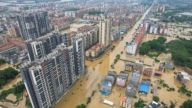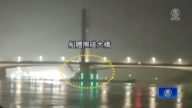【新唐人2013年05月18日訊】中國是一個乾旱缺水極為嚴重的國家,也是全球13個人均水資源最貧乏的國家之一,而近年來中共當局一連串政策上的失誤,以及為了發展經濟不計後果的大規模開發,又使得缺水現象迅速加劇。對此,英國媒體發表文章指出,中國水資源短缺問題對經濟成長可能會造成影響,如果不儘早解決,「中國夢」將難以實現。
英國《金融時報》發表文章說,中國在快速發展經濟的同時,忘記了本身其實是個「缺水大國」,人均水資源只有世界人均水準的四分之一。中國經濟成長造成的消耗和環境污染,使得水資源短缺現象迅速惡化。與此同時,缺水問題已經開始威脅中國經濟的成長。
《金融時報》的文章引述「世界銀行」發佈的報告指出,水資源危機導致的經濟損失,已經約佔中國GDP的2.3%。
綠色和平氣候與能源項目主任孫慶偉:「一個好的經濟發展的模式,應該不只是保證短期內可以看到GDP的增長,應該說長期內,包括我們的下一代以及更遠,還有可持續發展的動力。這種只顧短期利益,使水資源遭到破壞,然後破壞環境這個事情,這種增長,我覺得是不可取的。那麼這個經濟發展不能是真正的發展。」
中國政治和社會觀察家戴晴:「這個GDP就沒有任何意義,他們就玩數字,覺得GDP漲高了,整個國民經濟就發展了,人民生活就幸福了,根本不問國民經濟發展的環境代價,也不問人民的幸福包含了多少威脅在裡邊。」
專家認為,中國水資源短缺主要原因,除了自然環境變化的因素之外,主要原因還是經濟建設過程中大量的工業用水、農業用水以及環境污染,而當局的接連不斷政策性的失誤更是令缺水現象雪上加霜,其中包括圍湖造田、三峽工程、南水北調、江河改道等備受爭議和專家反對的專案。
戴晴:「因為我們做過北京水短缺的調查,有兩條大河,是境外流入北京的,一條是西邊的永定河,一條是東邊的潮白河,這兩條大河都是因為上游修水壩,然後把水攔截住了,比如說永定河的上游,就是修了200個以上的水壩,水都攔住,所以永定河沒水了,完全乾了,潮白河也沒水了,也乾了。境內河就是污染,不能用,這也是水短缺的一個方面。」
孫慶偉:「 我們現在就看到了,他們大量的這種截斷河流,修水庫還有大量的抽取地下水,這些都造成了局部地區水資源的破壞。」
據統計,2012年至今,包括匯豐銀行、畢馬威、綠色和平、中國科學院地科所等在內的各大機構,發佈了不下10份有關中國缺水的報告。專家們警告:「20年後中國將找不到可飲用的水資源。」
面對著一份份缺水資料,中共官員似乎意識到了水資源短缺的嚴重性,提出了一些「亡羊補牢」的政策,但是卻沒有看見貫徹實施。
孫慶偉:「現在也有一些措施說是要加強水資源管理,但是離問題的解決還是有相當的距離。但是沒有看到一些很具體的措施去解決它,包括最根本的如何調整經濟發展的模式,就是說,這種過分的消耗資源,依靠破壞環境為代價的這種發展模式,如果要是不改變的話,那這個問題的解決真的是不容樂觀,那在這方面還沒有看到有切實的行動。」
《金融時報》還指出,中國水資源的短缺,已經影響中國社會、政治和經濟各個層面,如果當局不能解決水資源問題,那麼「中國夢」將很難實現。
採訪/易如 編輯/張天宇 後製/孫寧
Experts: In 20 Years Time No Water Will Be Left In China
China is a country with extremely serious drought problem.
It is also one of the 13 poorest countries for
water resources per head.
The mistakes in the Chinese Communist Party (CCP)
recent strategies and its reckless economic development,
have further exacerbated the water shortage problem.
An article published by British media on this issue wrote that,
water poverty may negatively impact China’s economic growth;
The “China Dream” will become difficult to achieve
if this problem is not solved as quickly as possible.
UK newspaper The Financial Times published
an article which said
in the rapid economic development China seems to be ignoring
the fact it is a huge nation with poor water resources.
It has only one-fourth of the global average amount
of water per person.
The continued decimation of natural resources and polluted
environment has quickly exacerbated the water shortage issue.
Now China’s economic growth is threatened by this issue.
The Financial Times article quoted a report of the World Bank.
This estimated the economic loss due to water poverty
has reached 2.3% of China’s GDP.
Sun Qingwei, head of Climate and Energy Project, Greenpeace:
”A good mode of economic development should
produce short-term GDP growth, and also protect sustainable
development for future generations in the long run.
In my opinion, the (CCP’s) mode of destroying water resources
and environment only for short-term interests is reckless.
Such economic development cannot be viewed as real.”
Dai Qing, observer of China’s political and social affairs:
”The CCP’s GDP is meaningless.
They are simply playing the number game, trying to prove
economic growth and better civil lives with a higher GDP.
However, they don’t care about the environmental cost of
such development, or depriving Chinese people of civil rights “
According to expert analysis, excluding the changes of natural
environment, the main reason for China’s water shortage is
still the massive emission of industrial and agricultural
water and water pollution.
The policy mistakes made by the CCP one after another
have made the situation even worse.
These mistakes include reclaiming lakes into fields, the
Three Gorges Dam project, south-to-north water diversion,
river diversions and other projects that were highly
controversial and opposed by experts.
Dai Qing: ”We have investigated the water
shortage problem of Beijing.
There are two big rivers flowing into Beijing
from the countryside.
One is the Yongding River from the west, and the
other one is the Chaobai River from the east.
A number of dams have been constructed on both
rivers upstream, which block the majority of water flow.
For example, over 200 dams are built on
the upstream of Yongding River.
Therefore the river is completely dry in Beijing.
The situation is the same for Chaobai River.
On the other hand, the rivers originating in Beijing
cannot be used due to pollution.
This is one aspect of the water poverty problem.”
Sun Qingwei: ”Now we see that the blockage of rivers with
dams and massively extracting groundwater has led to the
destruction of water resources in local regions.”
Statistics show that, since 2012 no less than 10 reports
have been released on China’s water poverty problem,
by HSBC Bank, KMPG, Greenpeace, Chinese Academy of
Sciences and other famous agencies.
Experts warn that, “No available water resource
will be left in China after 20 years.”
As so many research reports on water poverty were released,
the CCP officials seem to realize how serious the problem is.
Some remedial measures have been presented,
but have yet to be implemented.
Sun Qingwei: ”Currently there have been some efforts
aiming at improvement of water resource management.
However, we are still far away from solving the problem, as
we haven’t seen any real implementation of those measures;
Especially in adjusting the mode of economic development.
If the style of over-consumption of natural resources and
destroying environment for economic growth does not
change, we cannot have any optimism about the situation.
Till now there has been no real action to make such a change.”
The Financial Times article further commented on the water
shortage problem has shown impact on China’s social, political, and economic affairs;
Without solving this issue, the CCP would never
achieve the “China Dream” they depicted.




























